Namasivayam Ganesh Pandian is a MEXT alumnus who is currently working as a Junior Associate Professor and Principal Investigator at Kyoto University. I had the pleasure to interview him and talk about his background, his experience in Japan and his life as an academician in one of the best universities in Japan.
*This article has been edited from the original interview for brevity and clarity.
Applying for the scholarship
How did you find out about the scholarship?
I was in the Indian Institute of Technology -Madras as a Project Associate doing my research there. I was looking for getting a PhD in a country with advanced science like Japan. My cousin introduced me to a professor at Niigata University, called Hidetaka Hori who was interested in having me as a PhD student. So, I explored various opportunities. First, I came with a scholarship from Hitachi, that was one year. I went to Niigata University. And then I applied to MEXT for my PhD.
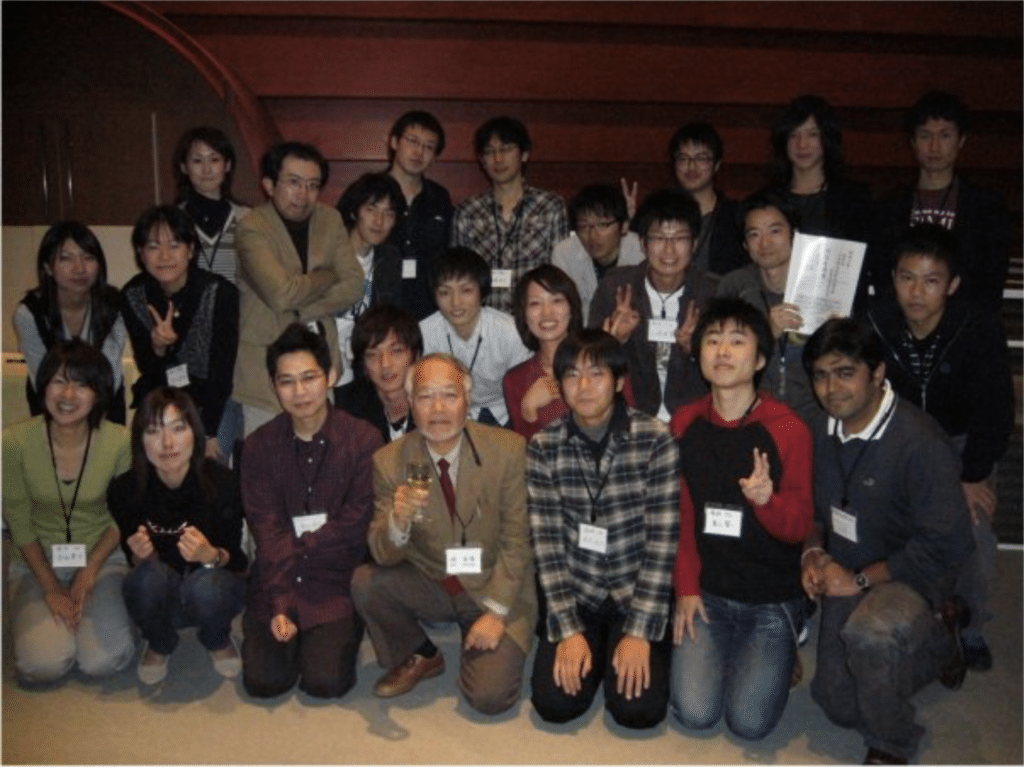
Ganesh during his PhD at Niigata University with Hori Lab members
Did you know any Japanese (language) before coming to Japan?
I didn’t know any Japanese.
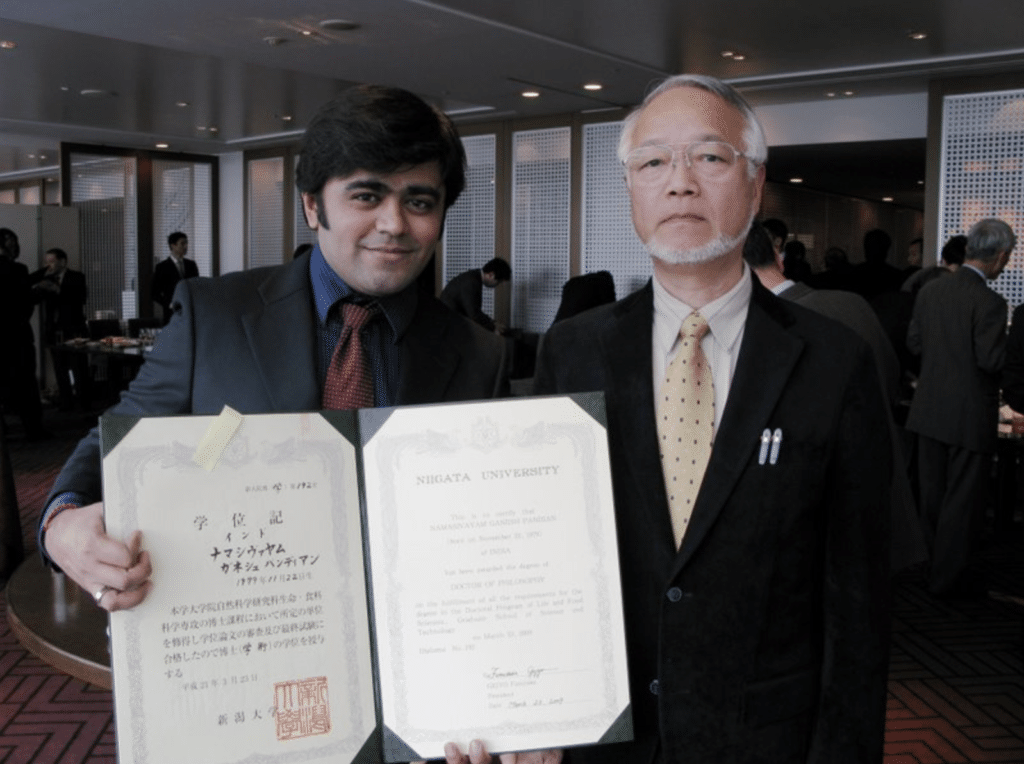
Ganesh with Professor Hori after PhD graduation
Going from student to working on the academic field
Oh wow. I imagine your classes, and of course, your research, were in English; but, apart from that, in your daily life, you go out and everyone speaks Japanese. Was that hard for you? How was that experience for you?
It was very tough for me. Niigata University wasn’t a very “international” university at that time (2006). I was the only Indian in my university. Not many foreigners around: a few people from Bangladesh, Poland. There was no international community at that time and not as many people there speak English, as it is in Tokyo or Kyoto. So, it was very difficult for me initially. But that actually helped me, now that I look at it: Niigata is the countryside of Japan so not that many people there, and that sort of forced me to learn Japanese way in order to communicate. And then it was much easier when I came to Kyoto.
What’s your field of research?
In Niigata, I was working on immunology. Now I’m working on artificial genetic switches.
Is it difficult to work in the academic field here in Japan as a foreigner? I’ve heard that even for Japanese people, it is hard to find a job in a good university, and you’re working for Kyoto University, which is one of the best in Japan. Was it hard to the position?
Yeah, actually in 2010 I was wondering about this: whether to go back to my home country or somewhere else for my postdoc because language is a big barrier here and I thought that for foreigners it’s very difficult to get a permanent position. That was what my seniors told me and what I believed at that time. But one thing that I did back then is that I was persistent: I continued to do good work. I can call myself lucky too because not everyone who does a good job gets a good position. I think I was in the right place at the right time. (In 2016 there was an interview, and many people (Japanese and foreigners) applied for that.) I just focused on being persistent and doing my best on what I was doing. This job kind of came to me. I just grabbed the opportunity.
Is this the type of career you wanted to have or is it a bit different from what you imagined you’d be doing?
The dream of every academician is to get into an academic position, a tenure track, and one advantage I had here is that the tenure track was completed in two years: I was a project-specific professor in 2014 and in 2016 I got a permanent position. So, this is one thing I dreamed of because it is very difficult these days to get a permanent position in a big university. Having this position actually helped me to continue my career: I’m also a visiting professor at Rutgers University and AO Research Institute Davos (ARI) in Switzerland. So even while being in Japan, I’m not missing out those international connections.
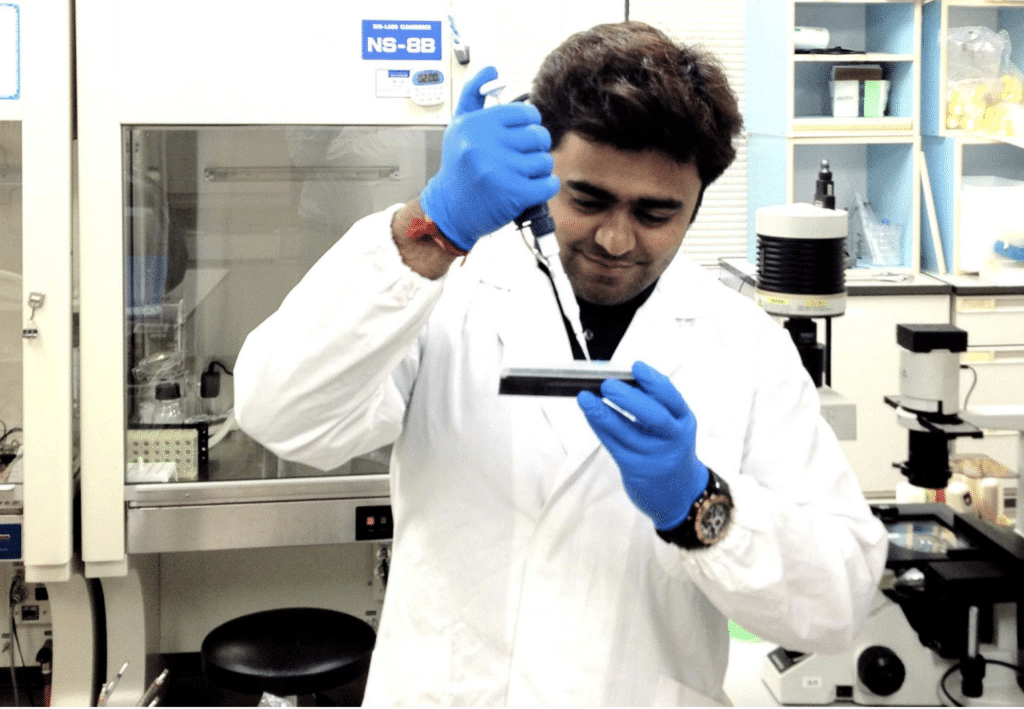
Ganesh in his lab doing experiments
Oh wow, that’s very impressive. The last person I interviewed has a very different career path, so I asked him about the differences between working in a Japanese company and in a foreign one. But I imagine that might happen too in academics. What do you think about this? When you go visit those universities, do you feel any differences: is the working/research culture or environment different than it is here?
Very different. For example, I’m also an honorary visiting scientist in Switzerland. There the work culture is very laid back and very different: here the work-life balance is not very good so related to that, there, the work-life balance is very good. In the USA, the research is more result-oriented and in Switzerland for example, the research is more passion-oriented. Here is more like profession-oriented, so whether you get a result or not, you need to give your best all the time.
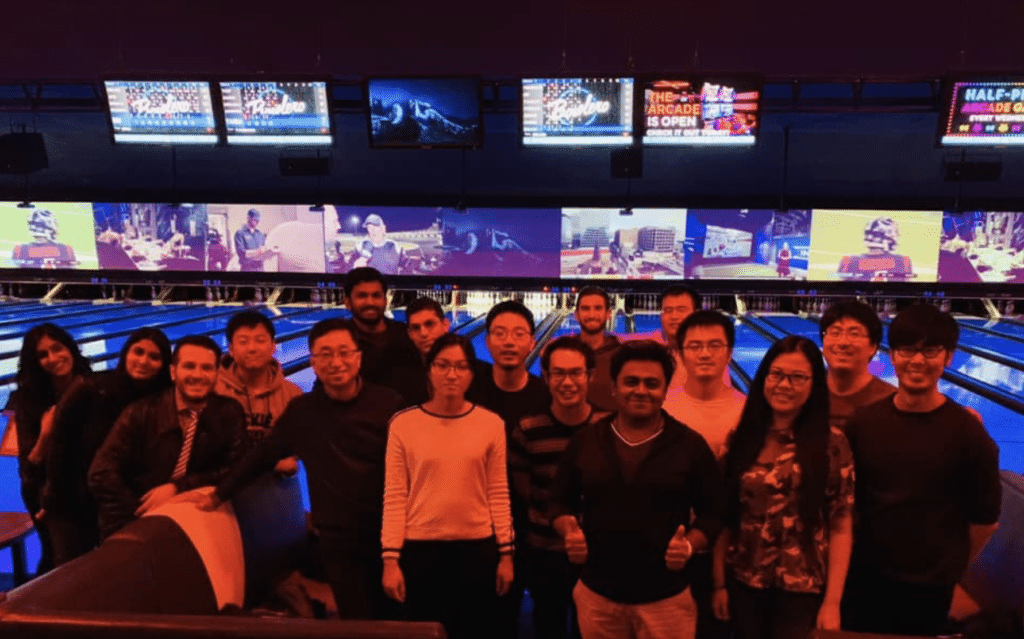
Ganesh in his onsite lab of Prof. KiBum Lee at Rutgers University, New Jersey after a bowling party
Being a mentor
You have your own lab right now, right? I guess that means you have Japanese students that go to your lab, is there anything like them not wanting to go to a lab with an international professor? You know how sometimes Japanese people are not very confident about being able to understand if it’s in English, so I’m guessing that maybe they might think it will be harder in your lab than in order. You might also get mixed reactions: students who are very interested in your lab because of that “international” part and people who don’t want to go to your lab because of that, is that how it is?
Yes, I have my own lab now, www.namasivayam.icems.kyoto-u.ac.jp Particularly, students are OK because they want to learn so the percentage of applicants for our lab is very high. But, when I want to hire people, for example, post-docs, they prefer to go to famous Japanese professors. So, even though I think it’s fair to say that I’m famous as a foreigner if they have a choice, they always prefer a Japanese professor. Of course, not everyone, for example, Chinese students prefer Japanese professors, Indian and Japanese students prefer international professors like me. Although sometimes, Indian students prefer Japanese professor because they want to have a Japanese mentor. It’s mixed actually. To be honest, more Japanese prefer me as their professor than Indians.
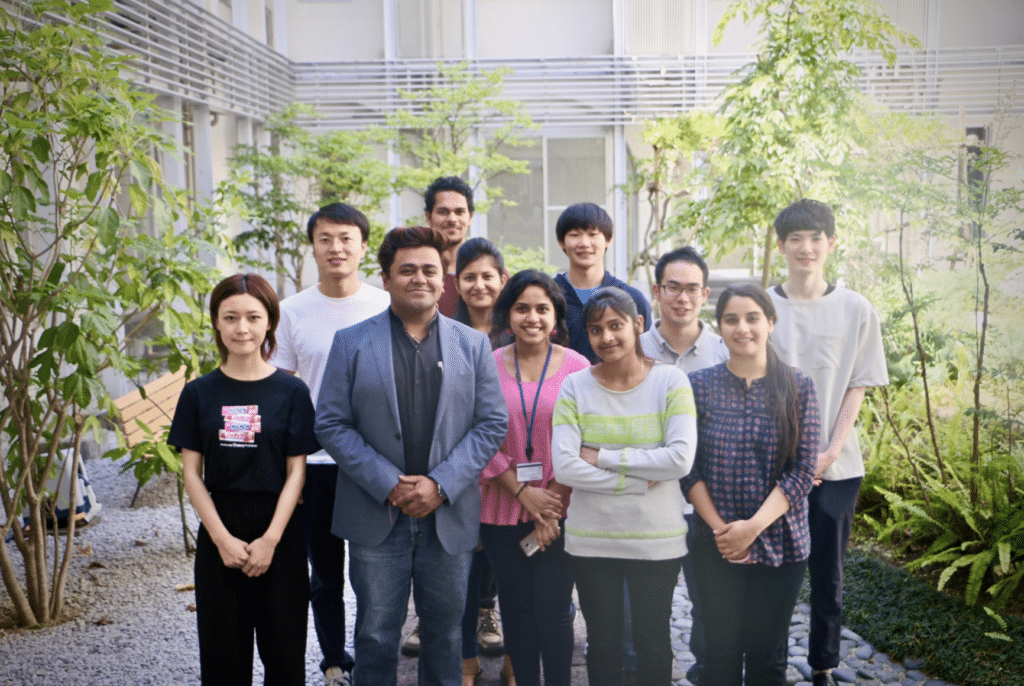
Ganesh with his current lab members in iCeMS, Kyoto University, Japan.
I went to Hokkaido University as an undergrad and what I’ve noticed there is that there were very few international students in undergrad, but they were the majority when it came to masters, etc. Is that similar in Kyoto University, are there more international students than Japanese on the labs?
Yes, you’re right. Particularly, research and PhD people mainly come from China. Most of them have an exchange program or are funded by MEXT or some other program in China. Also, Indian students. Well, I usually mentor the students under Professors of certain faculties at Kyoto University or Nagoya University. At this moment, I closely intertwine with Professor Hiroshi Sugiyama and mentor a set of his students and most those students are either Chinese or Indian. The ratio is 3 to 1: so, there would be 3 international and 1 Japanese. Typically, 2 Chinese, 1 Indian and 1 Japanese. This is for PhD students. Masters usually all the time is Japanese students.
How many students do you mentor?
It is always not fixed. But usually, I supervise about 9 to 10 students, it’s not fixed. For example. Prof. Sugiyama prefers to send the international students to me, so actually, that’s the reason why I have so many people under me.
Are many of the international students at your lab also MEXT scholars?
Most of them have their own funding. I rarely have some students with no funding. Usually, they come to Japan without any scholarship and they apply here, and most of the times they get it because in Kyoto University there are a lot of scholarships available. I also know the pain of not having money and, of course, I want them to work on their research and not worry about financial issues, so I have the list of the scholarships and always give it to those who need it. Currently, I mentor an Indian MEXT Scholar named Vinodh Joseph.
One of the things we want to do in MSA is that alumni like you or me, provide advice to the scholars who are just starting. Whether that is about living in Japan, how to get used to things or scholarship or research opportunities that they might not know about, so now that you mentioned that you try to help the international students by telling them about the opportunities that are available and I think that is very kind of you. What else do you think we as senpai could do for the new scholars coming to Japan or those who want to get the MEXT scholarship?
I think there should be regular meetings, at different parts of Japan; particularly at places where there are many students such as Kyoto or Tokyo where the chance of getting the scholarship is very high. So, I think is these places we should have meetings at least twice a year to have a program where alumni and scholars can meet and exchange. Similar to what you are doing now with your online presence, this kind of platform can reach more people. Also, the people in Tokyo and Kyoto are fine enough, but for example when I was in Niigata, I have a very difficult time. I think that these days the scholars’ rate in those countryside places, for example, Shimane is getting higher and maybe they don’t even know that there is an association, they don’t have people to talk to, they don’t have people to share with, they don’t have people to go to for guidance. I think in that aspect, I think MSA should reach all of Japan, particularly the countryside, and I think that can be achieved by the Facebook page.
Future plans and message to kouhais (juniors)
Well, I think we have already covered your trajectory since you came to Japan, which leaves us with the future. What would you like to do, for example, 5 years from now? Whether that is research-related or in your personal life. Do you see yourself in Japan in five years from now?
To be frank, I want to build my own brand. At this moment, I’m known as a Kyoto University Professor, but I want to be known as Ganesh (laughs). I know that is very ambitious but what I actually want is to be both, an academician and an entrepreneur.
Is that related to the work that you are doing now? Could you tell me a little bit of what it is about?
To put it in simple terms: we are all made from letters, we call it DNA. DNA is composed of four letters (basically molecules) A, T, G and C. So, we humans and anything that we call as “life” is made from a combination of these letters. My research is related to gut bacteria. Bacteria communicate by two letters, again basically chemicals. So, there are two letters in bacteria which can basically read the four letters in the human DNA. Those are called Pyrrole-imidazole polyamides or PIPs. Basically, what I’ve found in my research is we can make use of these two letters, the language of bacteria, to communicate with the human DNA, genetically engineer the human and clean the rare disorders. Particularly my contribution was about mitochondrial research. It is very difficult to change the mitochondria, so we worked with chemicals in the bacteria, managed to change it and to switch on and off the genes in there. This way those diseases can be reversed. The difference between this and taking medicines or any other form of treatment is that this directly fixes the source of the disease and not just treat the symptoms. We call them smart genetic switches.
Professor Sugiyama has started a company (https://www.regugene.co.jp) about this research and I’m the Chief Scientific Advisor there.
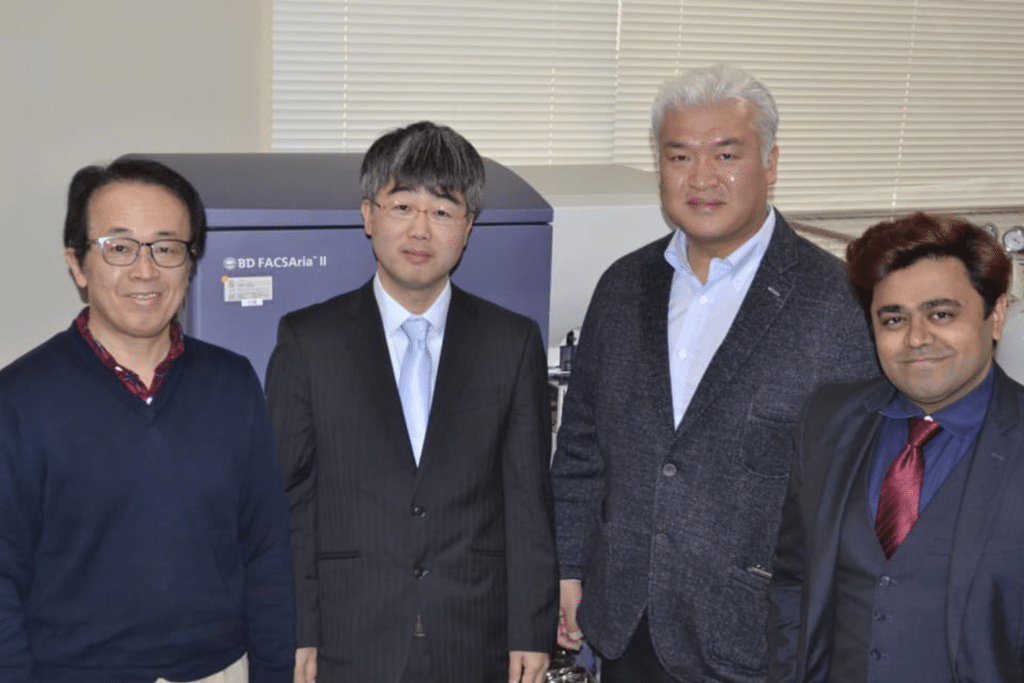
Ganesh with Prof. Hiroshi Sugiyama and the stockholders of the new venture company ReguGene
Wow, that is really impressive. So, what are your plans for the future then?
I want to launch my own company in five years. At the same time, I would like to see my research benefit someone. Particularly, I want to treat the rare diseases for example autism or Down syndrome. In 2017 I made this breakthrough study so it was on many websites and then so many patients contacted me. While it made me very happy, I felt more responsible. This the reason why I want to start the company to make my research as useful. I want to work on these genetic diseases as well as terminal diseases.
Well, thank you so much for the interview. Is there anything you would like to tell the kouhais?
Yes, two things. First one is about research, we need more scientists than engineers or technicians: don’t go to technology to make life easier for us but help those in need. The second one is about motivation as foreigners in Japan, Japan is changing and I think we need to blend in well with the Japanese, that is the key to success here: we are in their country so first we need to understand what exactly they require so if you give them what they want, they will give you what you want. And of course, be ambitious, you never know, you might get what you want. I want to quote a couplet from the famous classic Tamil text thirukkural: “கான முயலெய்த அம்பினில் யானை பிழைத்தவேல் ஏந்தல் இனிது”.
This means, “It is more pleasant to hold the dart that has missed an elephant than that which has hit hare in the forest”. So be ambitious and stay focused.

